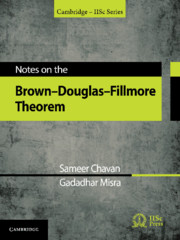Book contents
- Frontmatter
- Dedication
- Contents
- Preface
- From: The Evolution of Modern Analysis, R. G. Douglas
- Overview
- 1 Spectral Theory for Hilbert Space Operators
- 2 Ext(X) as a Semigroup with Identity
- 3 Splitting and the Mayer–Vietoris Sequence
- 4 Determination of Ext(X) as a Group for Planar Sets
- 5 Applications to Operator Theory
- Epilogue
- Appendix A Point Set Topology
- Appendix B Linear Analysis
- Appendix C The Spectral Theorem
- References
- Subject Index
- Index of Symbols
2 - Ext(X) as a Semigroup with Identity
Published online by Cambridge University Press: 30 June 2021
- Frontmatter
- Dedication
- Contents
- Preface
- From: The Evolution of Modern Analysis, R. G. Douglas
- Overview
- 1 Spectral Theory for Hilbert Space Operators
- 2 Ext(X) as a Semigroup with Identity
- 3 Splitting and the Mayer–Vietoris Sequence
- 4 Determination of Ext(X) as a Group for Planar Sets
- 5 Applications to Operator Theory
- Epilogue
- Appendix A Point Set Topology
- Appendix B Linear Analysis
- Appendix C The Spectral Theorem
- References
- Subject Index
- Index of Symbols
Summary
In his very influential article [72], Halmos listed ten problems for Hilbert space operators. One of these (Problem 4) asked “Is every normal operator the sum of a diagonal operator and a compact one?” Soon after the question was raised, Berg [20] and Sikonia [129] independently of each other showed that the answer is “yes”. Much of what follows reproduces their theorem generalizing the Weyl–von Neumann theorem. Moreover, we recast this theorem in the language of the ‘Ext” group.
Essentially Normal Operators
An essentially normal operator defines an extension of C(X), where X is the essential spectrum of T, by the compact operators, or equivalently, a*-monomorphism of C(X) into the Calkin algebra and conversely. One of the main goals of this chapter is to show the advantage of studying the class of essentially normal operators using the C*-extensions they define. We begin by recalling the notion of an essentially normal operator and other notions closely related to it.
Definition 2.1.1
An operator T in is essentially normal if the self-commutator [T, T*] of T is compact. We say that T is essentially unitary if T is essentially normal and T*T − I is compact. Two operators T1 and T2 in are said to be essentially equivalent if there exists a unitary operator and a compact operator such that. In this case we write, T1 ~ T2.
Remark 2.1.2 Let T1, T2 in be essentially equivalent. Then,
(1) T1 is essentially normal if and only if so is T2.
(2) T1 is Fredholm if and only if so is T2. In this case, ind(T1) = ind(T2).
In particular, T1 and T2 have the same essential spectra and index data.
Note that any operator is essentially equivalent to its compact perturbation. Here is one concrete illustration of this general fact.
Example 2.1.3 Let be a sequence of positive numbers such that
The weighted Hardy space of the open unit disc, denoted by is given by
is endowed with the inner-product
The shift operator is given by
If for all integers; then is nothing but the Hardy space introduced in Example 1.5.2. In this case, Mz agrees with the shift operator.
Information
- Type
- Chapter
- Information
- Notes on the Brown-Douglas-Fillmore Theorem , pp. 57 - 90Publisher: Cambridge University PressPrint publication year: 2021
